
 |
|
|
|
After being available for decades (generations? ) only as a fairly feeble pan-scanned TV print, Delmer Daves' 1954 Drum Beat had pretty much dropped from the radar. It showed up finally on TCM a year or two ago in its original extra-wide CinemaScope screen shape. It's not a bad show, but writer-director Daves seems to intent on repeating the box office magic of his own Broken Arrow, this time for producer-star Alan Ladd, who all but sleeps through his own starring role. After an admirable career writing and directing at Warners, in the '50s Daves bounced between several studios, often making westerns. Fox's Broken Arrow, the hit that helped make him a 'free agent', is a glossy attempt to portray the Native Americans as the noble good guys, even though it's really about the love of James Stewart's 'sensitive' westerner for a beautiful Indian maiden (Debra (sigh) Paget). Audiences accepted Broken Arrow as a socially conscious picture, when it's little more than a remake of the pre-Code miscegenation drama Bird of Paradise. The formula never changes: white guy goes gaga for a dusky princess of a different race, which means that the unlucky princess can't live to see the 'The End' title. Daves was never one to let go of a good thing: his next picture for Fox was a direct remake of Bird of Paradise, again starring Ms. Paget. 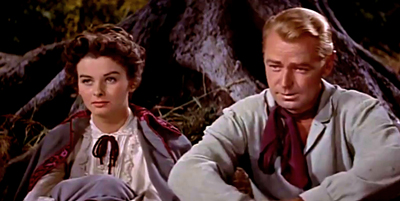
One of the subplots of Drum Beat applies the same dramatic construction to a historical rampage that occurred in the Northwest, the very real Modoc War of 1872. A bitter guerilla struggle that resulted in numerous civilian deaths, it involved peace councils, cloudy loyalties on both sides and the colorful Indian rebel Kintupash, aka Captain Jack. Moved to a reservation and inadequately fed, the Modocs refused to accept the treaty's terms; they came back with a vengeance when they found that settlers had taken over their land on the Lost River . Indian fighter Johnny McKay (Alan Ladd) walks into the White House to chat with President Ulysses S. Grant (Hayden Rorke). "Unconditional Surrender" Grant asks Johnny to go back to the Oregon Territory and help General Canby (Warner Anderson) make peace with the rampaging Modoc tribe. Johnny is accompanied by the beautiful Nancy Meek (Audrey Dalton), who wants to rejoin her family. Even as they near town, a Modoc attacker kills Lily White (Isabelle Jewell), the sweetheart of coach driver-Indian fighter Bill Satterwhite (Robert Keith). Nancy finds her home burned out and her relatives killed. Johnny notes that local businessman Blaine Crackel (Elisha Cook Jr.) is dealing with the Modocs and providing them with weapons. The Modoc renegade Captain Jack (Charles Bronson) has bought Blaine's loyalty by providing him with an Indian wife, as he has a few other local whites. "Good" Modocs Toby and Manok (Marisa Pavan & Anthony Caruso) try to help Johnny with his peace mission; Toby declares her love for Johnny but he's more interested in Nancy, who has decided to stay and rebuild the property she's inherited. The problem seems to lie with Captain Jack, a boastful egotist who killed Nancy's Uncle just to take his medals for his stolen army coat. Jack holds all white men in contempt and assumes the right to kill, steal and ignore treaties as fits him. Toby and Manok help arrange a peace council with Johnny, General Canby and the Indian sympathizer Dr. Thomas (Richard Gaines), a meeting that Johnny is certain will become an ambush. 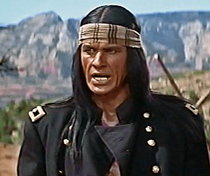
Like the western Arrowhead by Charles Marquis Warren, Drum Beat makes noises about peace with the Indians but in actuality advocates a hard line approach. Little is said specifically of why the Modoc are on the warpath. The feared Captain Jack is the perfect poster boy for Indian-killing, as he's the frontier equivalent of an incorrigible juvenile delinquent, a smirking Wild One with a rifle and a knife instead of a motorcycle. The sneering Jack shows no pity on his victims and his 'gang' goes by nicknames like Scarface Charlie (Rodolfo Acosta) and Bogus Charlie (Perry Lopez). When it's all said and done, President Grant's peace mission is hopeless and the pacifist Dr. Thomas an annoying fool. Drum Beat preaches the conservative line, that all those hooligans are just 'haters' that need to be locked up or strung up. 1 Writer Daves doesn't simplify his story, which suffers somewhat from character sprawl. There are at least 15 characters to keep track of, from settlers that will be massacred to a stack of Indians and a dozen or so Army personnel. Edgar Stehli is President Grant's amusing father. Peter Hansen (When Worlds Collide) is a Lieutenant that also falls in love with Nancy Meek, a sub-subpot given exactly about twenty seconds of screen time. 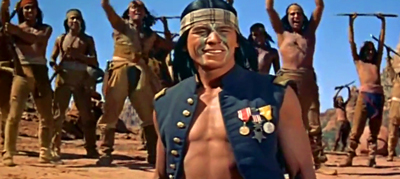
The film's awkward opening starts right at the White House, where visitors can just walk in off the street and ask to see the Prez. (This apparently was true.) We then go right to the Oregon Territory to show that all those Eastern Indian-huggers haven't a clue about frontier realities. Sixth-billed Charles Bronson (using that name for the first time) is again an Indian as he was in Robert Aldrich's Apache, but time he's given a real character to play. Bronson's Captain Jack is an illiterate and infantile barbarian, a natural savage not far removed from Paul Muni's Scarface. It's almost amusing that anybody trusts him for a minute, because he kills friends and foes alike. The fun is wondering when he will decide to strike next. One nice bit of truthfulness is reflected in Daves' script -- Captain Jack's rebellion begins to break up when a number of his scummy cohorts just decide they're tired of fighting and give themselves up. Even though they've been murdering like all the rest, these braves are apparently not among the individuals that go to the hangman at the finish. 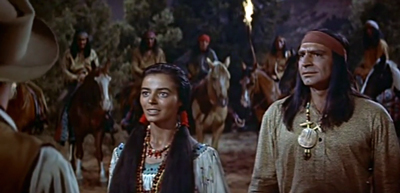
The 'Indian Princess' angle lifted from Broken Arrow is almost unpleasant. The adorable Marisa Pavan definitely gets the sharp end of the stick. Her Toby does all the real peacemaking work for Johnny MacKay out of love, a gift that MacKay accepts all to casually. The clear-eyed Toby steps right up to remind him of their former affections and says they should marry, but MacKay says nothing and just keeps smiling. Apparently Toby must keep proving her love until she's dead, even though it's fairly obvious that MacKay has already opted for the squeaky-clean white babe from The Beltway. For her part, Audrey Dalton is equally gorgeous and possessed of a gentle grace that makes her perfect to play virginal Good Girls that win the hunk by default. The only problem is that MacKay never takes emotional responsibility for the death of the vibrant Toby. Peace emissary my a__. Drum Beat is a handsome color production in early CinemaScope, with the extra-wide aspect ratio and the lenses that distort anything closer than ten feet from the lens. Thus the movie has that early 'Scope flat look, with human figures often arrayed in a line across the screen, often with nothing in the foreground. This explains the fact that most exterior shots of the stars talking in medium close-up are process setups back in the studio. It's not done that way just to record good audio, it's also to shoot the star in a controlled situation with a lens carefully adjusted to not give him the "CinemaScope Mumps". Since process cinematography close-ups are done with long lenses, the faces on screen are big, yet not intimate. The frame grab included of Charles Bronson in front of his warriors (second picture above) shows a bit of the "mumps". As can be seen, Bronson isn't all that close to the camera, and his face is already beginning to squash horizontally. 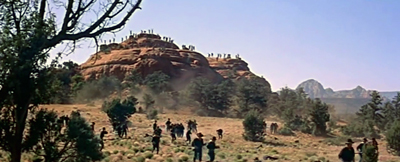
CinemaScope was launched in 1953, and every studio clearly thought it perfect for westerns -- the Great Outdoors looked even greater when spread out across a fifty-foot screen. Drum Beat was filmed in the beautiful rock country around Sedona, Arizona, and the woods of Flagstaff. It's a lot drier than the Northwest woods. We also don't see any of the ancient lava beds of the real Modoc area, that still draw tourists to Southern Oregon. Drum Beat only occasionally feels up close and involved with the action. A nice final scene has Charles Bronson, Alan Ladd and their respective stuntmen carry on a bruising fistfight on a creek that runs across some bare red rocks. Whenever someone falls it looks genuinely painful, as there's no way to pad anything. As the 'Scope lenses don't allow human figures to get big enough to dominate compositions, we sometimes find ourselves thinking about the attractive scenery more than the story. When cameramen were allowed to experiment, these problems were soon overcome. Delmer Daves' own Jubal and The Last Wagon would handle CinemaScope much better. 
The Warner Archive Collection DVD-R of Drum Beat is a handsome encoding of this colorful show that seemed unavailable in a decent copy ever since it went to television. The source is in good shape. Victor Young's score busily shifts between themes and moods, and sounds bright and brassy. This was one of Alan Ladd's personal productions from his "Jaguar" company, but filmed through and distributed by Warner Bros. It may have been Ladd's first independent outing.
On a scale of Excellent, Good, Fair, and Poor,
Drum Beat rates:
Footnoes:
1. The movie Arrowhead is even more specific about laying the blame for society's ills on wild youth, specifically 'student radicals'. Jack Palance plays the Native American juvenile delinquent Toriano in full maniac mode. Having just returned from college back East, Toriano strips off his white man's clothing, shakes down his long wild hair and declares that now that he knows what his oppressors are like, he's ready and eager to wage war on white civilization.

Reviews on the Savant main site have additional credits information and are often updated and annotated with reader input and graphics. T'was Ever Thus.
Review Staff | About DVD Talk | Newsletter Subscribe | Join DVD Talk Forum |
| ||||||||||||||||||